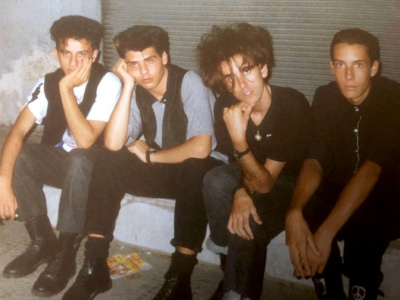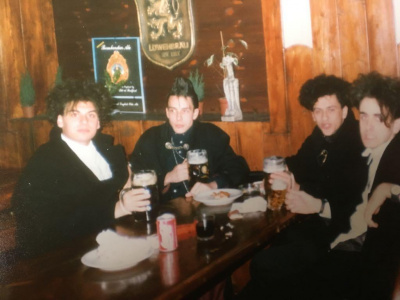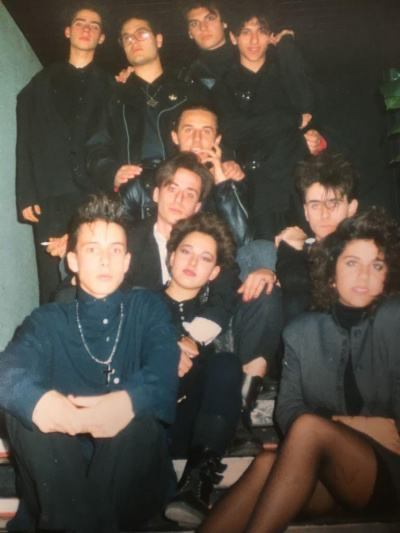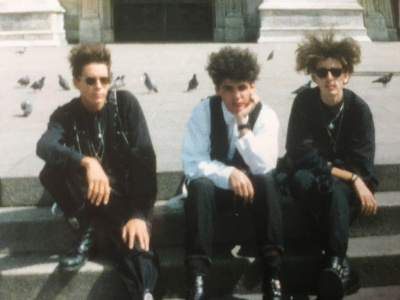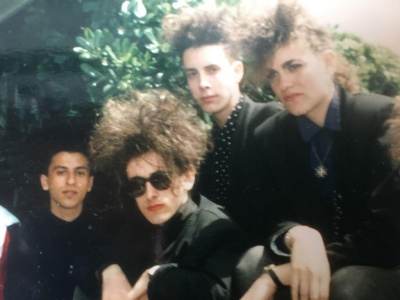
Italy’s Unseen Foreigners and Immigrants
American-Lebanese journalist Justin Salhani reflects on his life in Milan: His first-hand experience of Italian indifference to the Other, what it meant to feel socially invisible, the idiosyncratic presence of second-generation singers and rappers on Italian mainstream media, Italy’s dependence on cultural artifacts imported from overseas.
An Unwanted Superpower
I’ve often thought of what superpower I’d like to have. Imagine being able to speak every language on Earth. Think of how it would lead to new friendships, new experiences, and a wider understanding of those around us. I’d also like to have the ability to fly. Rising high above cities or towns to gain a moment of perspective and reflection with the air brushing my skin and with it a reminder of how every passing moment is ephemeral. One superpower I never wanted, however, was invisibility.
As a foreigner, Milan can be a cold place. The winter fog that descends, gulping up the towers and obscuring the horizon, can make it so that the feeling of being unseen is not always metaphorical. Often, when walking through the underground – the metropolitana – I’d see advertisement posters of smiling people who didn’t look alone. These posters, however, rarely reflected the diversity of people who took the underground. There’s something ironic about the visibility of this wide range of people – speaking in Bengali, Chinese, Spanish, English, Tagalog, Urdu, or Arabic – being limited to the underground.
Loneliness was a common factor among a group of foreigners I befriended. There were people from Colombia, Egypt, Mexico, Türkiye, Sweden, Malta, Lebanon, and a girl born in China who had spent most of her life in Italy, though still hadn’t secured Italian nationality. They told stories of exclusion from well-meaning colleagues, like not being invited to dinners with their Italian colleagues, not out of conscious dislike or outward racism, but because they assumed the foreigner had their own things to do. Italians were friendly. Sometimes helpful. But they didn’t see us as they saw each other. «When will you invite us to Istanbul», the Turkish girl’s colleagues asked. She’d worked there for three years and never been invited by a colleague for coffee. We were seen, but unseen. Some part of our humanity was invisible.
In an effort to make myself less of an invasive entity into Italian culture, I searched for local music. One of the largest music genres in the Italian contemporary scene was trap music. It was simultaneously familiar and foreign. The beats, synths, and flows matched the idiosyncrasies of American trap stylings. The only difference was that the lyrics were in Italian rather than in English.
So much of the outside world may feel rejected at times in a place like Milan, but trap music was arguably more mainstream in Milan than in any American city outside Atlanta. Trap is also the one scene where the faces of minorities are starting to be seen in Italian society. It made me wonder, did some of these Italians or mixed or minority ethnicities turn to the music of a foreign culture because they couldn’t see themselves in a domestic one?
The Capital of Italian Trap Music
Many of Italian music’s biggest trap stars call Milan home. Few are bigger than Ghali, an Italian of Tunisian heritage, who fuses French, Arabic, and English into his Italian songs. One of his biggest hits arguably brought the word «Habibi» into the Italian lexicon.
One of my personal favorites is Laioung, a rapper of Italian and Sierra Leonean origins who was building global connections with artists across Europe and Africa. His verses traverse Italian, French, and English, sometimes all in the same chorus. There’s also the 2019 Eurovision contestant for Italy, Mahmood, who is Italian-Egyptian. His famous song «Soldi», weaves in Arabic terms as well as references to his Egyptian heritage and culture.
Beve champagne sotto Ramadan
Alla TV danno Jackie Chan
Fuma narghilè mi chiede come va
(He drinks champagne during Ramadan
On TV it’s Jackie Chan
Smoking narghile [shisha], he asks me what’s up)
Mahmood: «Soldi» (2019)
Simply by being visible in a mainstream subculture makes artists like Ghali, Laioung, and Mahmood messengers. Some trap artists, though, go further to confront the exclusion and racism felt by a country they call their own.
Tommy Kuti is of Nigerian parentage, but has also spent time in the U.K. and the U.S., and is adamant that this doesn’t make him any less Italian. He addressed his mixed background, one of the myriad of new Italian identities, in his 2017 song «Afro-Italiano» from his album Italiano Vero.
Esulto quando segna Super Mario
Non mangio la pasta senza Parmigiano
Ho la pelle scura, l'accento bresciano
Un cognome straniero e comunque italiano
(I celebrate goals by Super Mario [Balotelli]
Don’t take my pasta without parmigiano
My skin is dark, with a Brescian accent
A foreign last name but nonetheless Italian)
Tommy Kuti: «#AFROITALIANO» (2017)
In a country where issues of multiculturalism are often seen as a distraction, Kuti refuses to be invisible. The act of speaking out as a minority of mixed identity is always political, even if that’s not the intent. There’s also Mike Lennon, who raps in Italian and English. He’s of Vietnamese parentage but commonly gets confused for one of the city’s numerous Chinese diaspora. In some of his songs, like «Faccio Soldi», he satirizes the casual racism he often faces by putting on a fake Chinese accent.
Ciao Phla, come stai? Tutto bene? (Eheheh)
E sto pe’ venile in studio, plepalato miclofono?
(In a fake Chinese accent)
(Hey Phra [his producer’s name, A/N], how’s it going? All good?
I’m coming to the studio, is the mic ready?)
Mike Lennon: «Faccio Soldi» (2020)
Lethal Consequences
Even with this infusion of mixed identities into a powerful cultural force that is undeniably Italian, problems of exclusion will continue to permeate Italian society. In September 2020, 21-year-old Willy Monteiro Duarte was brutally beaten to death for trying to intervene in a fight in a town South of Rome. Willy was born in Rome to parents from Cape Verde.
As one of the biggest stars in not just trap but contemporary Italian music in general, Ghali has a history of trying to avoid controversy. One Italian trapper I spoke to told me that Ghali speaks privately about the racism he’s faced in Italian society, but that he prefers not to speak publicly on issues that can be seen as political. However, the murder of Willy seems to have struck a nerve.
Ghali posted a photo of Willy to his Instagram page accompanied by a call to confront the racism still prevalent in Italian society. The idea that «he was only an immigrant» in Italian society devalued his worth as a person and stripped Willy of his humanity.
Sometimes, the lack of importance given to foreigners can be as negligible as not inviting a longtime colleague for coffee. Other times, as is the case with Willy, it can be lethal.
Biography
Links
Shop

Published on April 22, 2021
Last updated on June 27, 2023
Topics
Why do people in Karachi yell rather than talk and how does the sound of Dakar or Luanda affect music production?
Loneliness can feel like isolation, but can also be a positive solitude by keeping distance from the worlds’ chaos.
What happens, when artists move from one to another country? For example, when an Arab artist replaces the big tractors in her the village with big jeeps of the West.
How artistis deal with this non-natural but political category as a result of its ideological dominance.
Snap





